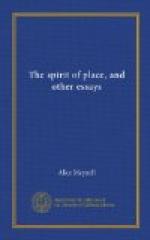Even when the stroller’s life took her to towns she did not hate, but loved—her own Douai, where the names of the streets made her heart leap, and where her statue stands, and Bordeaux, which was, in her eyes, “rosy with the reflected colour of its animating wine”—she was taken away from the country of her verse. The field and the village had been dear to her, and her poems no longer trail and droop, but take wing, when they come among winds, birds, bells, and waves. They fly with the whole volley of a summer morning. She loved the sun and her liberty, and the liberty of others. It was apparently a horror of prisons that chiefly inspired her public efforts after certain riots at Lyons had been reduced to peace. The dead were free, but for the prisoners she worked, wrote, and petitioned. She looked at the sentinels at the gates of the Lyons gaols with such eyes as might have provoked a shot, she thinks.
During her lifetime she very modestly took correction from her contemporaries, for her study had hardly been enough for the whole art of French verse. But Sainte-Beuve, Baudelaire, and Verlaine have praised her as one of the poets of France. The later critics—from Verlaine onwards—will hold that she needs no pardon for certain slight irregularities in the grouping of masculine and feminine rhymes, for upon this liberty they themselves have largely improved. The old rules in their completeness seemed too much like a prison to her. She was set about with importunate conditions—a caesura, a rhyme, narrow lodgings in strange towns, bankruptcies, salaries astray—and she took only a little gentle liberty.
THE HOURS OF SLEEP
There are hours claimed by Sleep, but refused to him. None the less are they his by some state within the mind, which answers rhythmically and punctually to that claim. Awake and at work, without drowsiness, without languor, and without gloom, the night mind of man is yet not his day mind; he has night-powers of feeling which are at their highest in dreams, but are night’s as well as sleep’s. The powers of the mind in dreams, which are inexplicable, are not altogether baffled because the mind is awake; it is the hour of their return as it is the hour of a tide’s, and they do return.
In sleep they have their free way. Night then has nothing to hamper her influence, and she draws the emotion, the senses, and the nerves of the sleeper. She urges him upon those extremities of anger and love, contempt and terror to which not only can no event of the real day persuade him, but for which, awake, he has perhaps not even the capacity. This increase of capacity, which is the dream’s, is punctual to the night, even though sleep and the dream be kept at arm’s length.
The child, not asleep, but passing through the hours of sleep and their dominions, knows that the mood of night will have its hour; he puts off his troubled heart, and will answer it another time, in the other state, by day. “I shall be able to bear this when I am grown up” is not oftener in a young child’s mind than “I shall endure to think of it in the day-time.” By this he confesses the double habit and double experience, not to be interchanged, and communicating together only by memory and hope.




